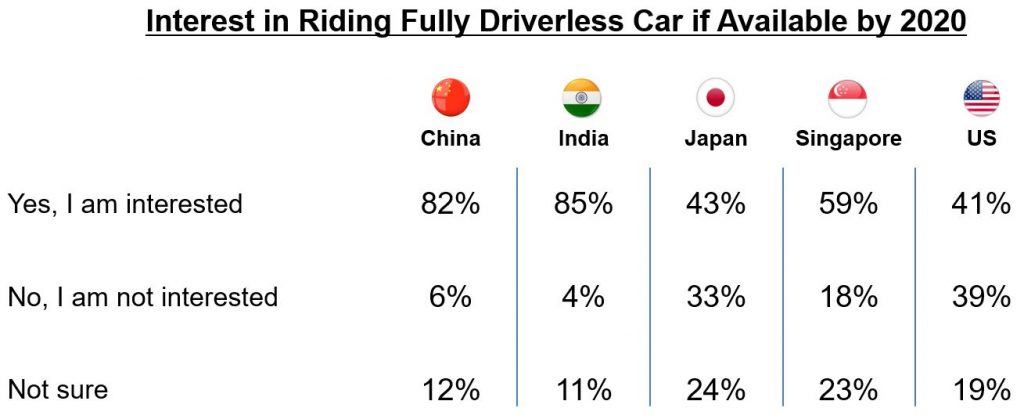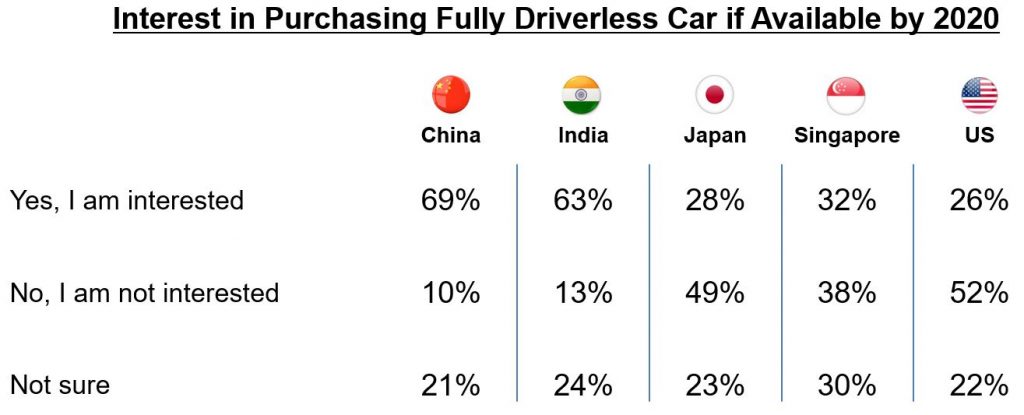The Future of Driverless Cars in Asia (Part 2)
We continue to see many news surrounding driverless cars. In August, we looked at how driverless cars are perceived by consumers in China, India, Japan, Singapore and the United States (click here if you missed our August article!). This month we wanted to follow-up by digging further into the reasons “why” consumers are interested vs not interested.
Interest in Riding vs Purchasing Fully Driverless Cars
As mentioned in the previous article, the year 2020 is regarded as a key milestone for driverless cars. Below is a quick recap of overall “interest in riding” a fully driverless car.
Q. Please assume that a fully driverless car becomes available in your country by year 2020. Would you be interested in riding one when it becomes available (not own, e.g. taxi, ride-sharing)?

Base: 20+ year olds, ~300 per country
We then asked about “interest in purchasing”. The overall trend of higher interest in China and India remains, but interestingly India and Singapore show a higher drop in interest (22% pts and 26% pts drop of “Yes” respectively, vs other countries that show only 13%-15% pts difference).
The “Yes” votes from initial interest of riding fully driverless cars in China and India tended to shift towards “Not sure” when it came to purchase interest, while in Japan, Singapore and the United States, it moved more towards the “No, I am not interested” side.
Q. Please assume that a fully driverless car becomes available in your country by year 2020. Would you be interested in purchasing one for personal use when it becomes available, if costs were acceptable to you?

Base: 20+ year olds, ~300 per country
Understanding “Why” Interested / Not-Interested in Purchasing
In order to better understand “Why” consumers have expressed interest or non-interest in purchasing fully driverless cars, we asked consumers to explain in their own words, why they said Yes, No or Not Sure.
Here, we picked up 2 out of the 5 surveyed countries – countries that have very contrasting levels of interest: India with higher interest and Japan with relatively lower interest.
Q. Could you explain why you said “Yes/No/Not Sure” to purchasing a driverless car?

Base: 20+ year olds, 302 interviews in India. Open-ends coded.
In India, key reasons of interest was that driverless cars will offer new experiences, making driving easier, as well as empowerment (enabling freedom of transportation and not being reliant on drivers). Here are some quotes straight from consumers.
- “I have never thought that one day I will ride a driverless car, it looks like a dream which is going to become true” Male 20-34, India
- “Driving has become tedious in today’s traffic. It will be awesome to have driverless car” Male 35-44, India
- “I need to [bother and] appoint a driver and pay salary to him. [I won’t need to] wait for his convenience to come or not. I can drive whenever I want.” Female 65+, India
Price is a key concern in India, followed by safety. Although price was not disclosed and framed as “if costs were acceptable to you”, there is common perception that such vehicles will come with a hefty price tag. Safety concerns center around lack of confidence in functioning properly, especially in areas with poor local infrastructure conditions.
- “I am sure these cars will be very expensive and I will not be able to afford one” Female 35-44, India
- “I am not confident about the safety and function of the car in Indian road conditions” Male 65+, India

Base: 20+ year olds, 298 interviews in Japan. Open-ends translated and coded.
Japan on the other hand places safety, convenience and need fulfillment as top reasons for wanting to purchase a driverless car. This makes sense in Japan as being one the fastest aging population where nearly a quarter of the population is over 65 years old.
- “I think that people’s driving skills decrease with age, so I would be interested if this will provide a safe and enjoyable drive” Female 45-54, Japan
- “Because I will arrive at my destination while I am asleep” Male 25-34, Japan
- “For elderly people, you need a car for hospital visits” Female 65+, Japan
Interestingly, consumer needs (lack of) and safety are also top reasons for not being interested. Many consumers expressed that they simply don’t need a car or that they don’t have a license. This could be the result of Japan’s high level of public transportation, especially in the city areas.
- “If it is not different from the bus, you can use a bus” Male 65+, Japan
- “I do not have a car license” Female 20-34, Japan
Safety concerns center around distrust in functionality and reliability, with skepticism that a fully driverless car will overcome all necessary safety measures. This also connected to concerns over liability, of who takes responsibility if you get in an accident when you’re not technically driving.
- “It makes me worried” Female 20-34, Japan
- “I do not think that full automatic driving is possible by 2020” Male 55-64, Japan
- “For example, when an accident happens, you do not know who is responsible. There is only anxiety” Female 65+, Japan
Development of driverless cars are picking up speed, and we increasingly hear about them on the news. However, convincing consumers of its safety, how it will benefit and meet individual needs and concerns will be an uphill road that will need to be carefully addressed.
Each market has unique needs and concerns as seen above, and it will be critical to understand these local dynamics, especially in such a diverse region like Asia.
◼Survey Details
Markets: Age 20+ in China, India, Japan, Singapore, United States
Sample Size: ~300 per country
Methodology: Online Survey using Rakuten AIP proprietary panels
Fieldwork Timing: August 5-8, 2017